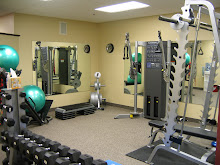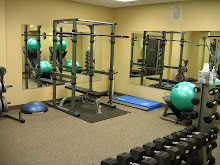You’ve heard all the bad things about sugar—it spikes your insulin, makes you retain more belly fat, and it’s been linked to serious health problems such as diabetes and heart disease. But what if I told you that there was one exception where sugar can actually be good for you and even help you gain lean muscle and lose more weight? Well, you heard it right, but there IS a catch…
You should only consume sugar after you workout, and I mean really working out—a walk in the park doesn’t count, unless you’re pushing a stroller that weighs 300 pounds. But hey, look at the bright side…you get to work up a good sweat, get lean, and lose weight while eating sugar!
But before I get into actually talking about what types of food (sugar) you should be consuming, let’s take a quick look at the science behind this process.
How Your Body Uses Sugar for Fuel
The energy that your muscles use predominantly comes from glycogen. Glycogen (glucose in storage form) is a form of carbohydrate that’s stored in your muscles for quick energy use. When you use your muscles during a workout, most of the energy is provided by glycogen. Glycogen is depleted fairly quickly during your workout, so the rate at which you replenish your glycogen greatly affects your muscle recovery and muscle building. The quicker you restore it in your muscles, the faster your muscles recover and more effectively you build lean muscle mass.
How To Restore Your Glycogen Faster
The higher the intensity of your workout, the more energy is utilized by your muscles and hence the quicker your glycogen gets used up. So, what do you need to do to restore your glycogen levels? In this situation, the speed of nutritional uptake is important, so liquid calories with the right combination of protein and simple carbs is your best bet. In normal circumstances, natural whole foods are always recommended over supplements and liquid calories. Complex carbs such as vegetables and some fruits are much better than simple carbs (sugar) because you want slower digestion which prevents your insulin from spiking. However, after an intense work out your goal is to restore your energy levels as quickly as possible… so it’s opposite of what you would normally want. The quicker the protein and carbs get into your blood stream the better, so it can quickly restore your glycogen level and help maximize your muscle recovery and muscle growth. For this reason simple carbs such as dextrose and maltodextrin (both are just different forms of sugar) and easily absorbed forms of protein such as whey isolate proteins are favored over whole foods.
When Should You Have Your Post Workout Drink?
Somewhere between within 1 hour after working out optimally restores your depleted glycogen levels. So don’t worry if you don’t have time to make a shake to bring it with you when you workout. You should have plenty of time to get home after working out and a make a quick shake to get the most benefit out of it.
What’s The Best Protein to Carb Ratio For a Post Workout Drink?
This will vary depending on who you ask or what studies you read. First, the protein to carb ratio ranges between 1:1 to 1:4 depending on your workouts. The longer the workouts and more endurance types of activities require a higher carb ratio such as 1:4. You cannot go wrong keeping your ratio at about 1:3-1:4.
What Should You Drink?
Do you remember chocolate milk? If you’re like me, the last time you had it may have been at lunch in grade school. Well, guess what? Chocolate milk actually makes for a pretty good post workout drink! Believe it or not, the protein to carb ratio is around 1:3, the recommended ratio of most recovery drinks. So the next time you workout and your feeling some what nostalgic, try drinking chocolate milk. As long as you’re not lactose intolerant, you may have just found your chocolate indulgence in a post workout drink.
If you are lactose intolerant, you may not be able to satisfy your chocolate cravings, but you have many other options when it comes to making your own post workout drinks. You’ll need just a couple of ingredients. You’ll need to get some whey protein powder. The whey protein isolates are recommended over other kinds of protein powder for it’s ease of digestion and absorption. And a sweet drink of choice. Stay away from drinks sweetened with high fructose corn syrup or crystalline fructose if possible. A combination of maltodextrin and dextrose have been proven to be the best at getting into your blood stream the fastest, but I wouldn’t get too caught up with that. Stick to natural sweeteners and avoid highly processed sweeteners. Even better, if you have a blender at home you can blend real fruits with whey protein, ice and make a cold post workout smoothie that’s both tasty and nutritious. The recommended amount of protein in your post workout drink ranges between 0.12 - 0.24 grams of protein per pound of lean body weight. So if you’re 180 lbs with 10% body fat, your lean body weight would be 162 lb. This means 19 - 39 grams of protein. And since the recommended protein to carb ratio for a post workout drink is around 1:3, your carb range would be 57 - 117 grams. This is not an exact science, so you’ll probably have to experiment a little with the ranges, but that’s a good starting point.
Faster Recovery Leads To Greater Fat Loss
If you are in the mind set that weight loss is all about cutting calories, think again. Remember, the more lean muscle mass you have, the more you increase your metabolism and the more calories you’ll burn throughout the day resulting in a greater total weight loss. Muscle is your body’s most efficient fat burner! That goes for both men and women, so replenishing your glycogen to optimally refuel and build lean muscle is critical if you ever want to shed those extra pounds and get your sexy back.
What’s your favorite post workout drink? Post your comments below!
Written by Shin Ohtake on Monday, July 20, 2009. MaxWorkouts.comEdited by Jason Copeland CSCS













